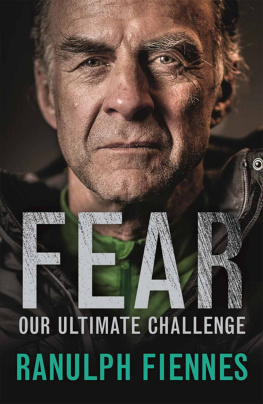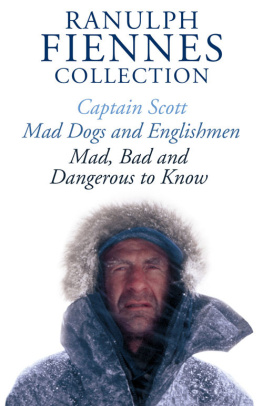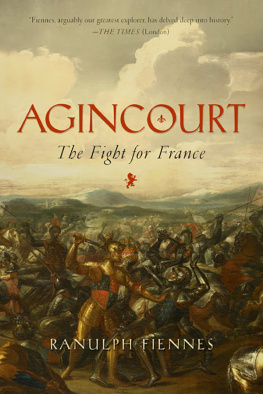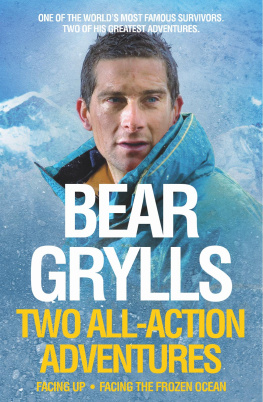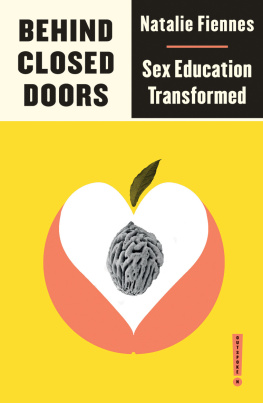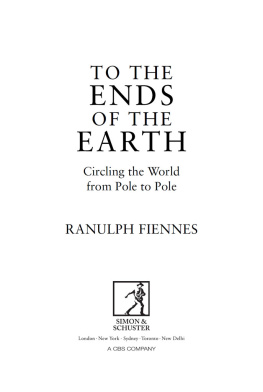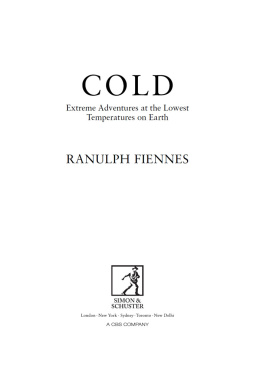About the Author
Sir Ranulph Fiennes was the first man to reach both poles by surface travel and the first to cross the Antarctic Continent unsupported. In the 1960s he was removed from the SAS regiment for misuse of explosives but, joining the army of the Sultan of Oman, received that countrys Bravery Medal on active service in 1971. He is the only person yet to have been awarded two clasps to the Polar medal for both Antarctic and the Arctic regions. Fiennes has led over 30 expeditions including the first polar circumnavigation of the Earth, and in 2003 he ran seven marathons in seven days on seven continents in aid of the British Heart Foundation.
In 1993 Her Majesty the Queen awarded Fiennes the Order of the British Empire (OBE) because, on the way to breaking records, he has raised over 14 million for charity. He was named Best Sportsman in the 2007 ITV Great Briton Awards and in 2009 he became the oldest Briton to reach the summit of Everest.
Also by Ranulph Fiennes
A Talent for Trouble
Ice Fall in Norway
The Headless Valley
Where Soldiers Fear to Tread
Hell On Ice
To the Ends of the Earth
Bothie the Polar Dog (with Virginia Fiennes)
Living Dangerously
The Feather Men
Atlantis of the Sands
Mind Over Matter
The Sett
Fit for Life
Beyond the Limits
The Secret Hunters
Captain Scott: the Biography
Mad, Bad and Dangerous to Know
Mad Dogs and Englishmen
Killer Elite
My Heroes
Cold
Agincourt
Heat

www.hodder.co.uk
First published in Great Britain in 2016 by Hodder and Stoughton
An Hachette UK company
Copyright Ranulph Fiennes 2016
The right of Ranulph Fiennes to be identified as the Author of the Work has been asserted by him in accordance with the Copyright, Designs and Patents Act 1988.
All rights reserved.
No part of this publication may be reproduced, stored in a retrieval system, or transmitted, in any form or by any means without the prior written permission of the publisher, nor be otherwise circulated in any form of binding or cover other than that in which it is published and without a similar condition being imposed on the subsequent purchaser.
A CIP catalogue record for this title is available from the British Library
ISBN 978 1 473 61801 5
Hodder & Stoughton Ltd
Carmelite House
50 Victoria Embankment
London EC4Y 0DZ
www.hodder.co.uk
For Simon and Fone, the very best of friends down the long years
Fear and Fearfulness
from the Bloomsbury Thesaurus
Fear: fright, terror, horror, horrification, affright, dread, awe, panic, phobia, aversion, mortal fear, fear and trembling, unholy terror, fit of terror, blind panic, icy fingers, cold sweat, blood running cold, hair standing on end, chattering teeth, knocking knees; informal funk, blue funk.
Fearfulness: nervousness, timorousness, apprehension, apprehensiveness, anxiety, uneasiness, tension, trepidation, consternation, perturbation, alarm, unease, disquiet, dismay, foreboding, misgivings, qualms, agitation, nerves, palpitations, shivers, quaking, shaking, trembling, goose flesh, goose bumps, butterflies in the stomach, sinking stomach, stage fright, shivers up and down the spine; informal the jitters, the jumps, the willies, the jimjams, the collywobbles, the heebie-jeebies, a flat spin.
Contents
1
The Fear Factor
If I were on the edge of a precipice and a large grasshopper sprang on to me I should prefer to fling myself over the edge.
Salvador Dali
T welve years ago, in 2003, I had a sudden heart attack on an easyJet plane about to take off from Bristol airport. Over the next three days in an NHS intensive care unit, twelve unsuccessful attempts were made to start my heart again. On the thirteenth attempt it obliged. By then a brilliant Italian surgeon had removed one twelve-inch artery from my leg and another from my mammary system (not much use to men!) to replace the two furred-up arteries that had caused my collapse.
Five years later, when I was crawling up a rope some 300 metres below the summit of Everest, a massive angina attack reminded me that my bodys engine was hovering around its sell-by date.
The original Bristol trauma occurred with no warning at all and I can still remember nothing about it. Although it nearly killed me, I felt no fear, whereas had I known what was about to happen I would, of course, have been extremely afraid.
The Everest trauma was preceded by extreme pain in my chest and I was immediately aware that, suspended from a rope on a near-vertical ice wall at almost 29,000 feet (8,800 metres) above sea level at midnight, I was about to have another heart attack. The result was immediate panic. I was more terrified at that moment than at any other time in my life and, as a result, failed to think and react sensibly. Initially, I quite forgot the glyceryl trinitrate pills in my jacket pocket, which I carried for the specific treatment of just such an angina attack. By the time I remembered the pills, ripped off my oxygen mask and located the bottle, the wire stitches that had held my rib cage together since the previous transplant operation felt as though they were being torn out of my chest.
Over the years I have experienced both apprehension and panic, and I learnt early on that to achieve success in my chosen career of breaking polar-travel world records, I would need to prevent fear from causing pessimism and negativity, both of which are powerful ingredients of failure.
Trained in the army to know your enemy, I studied all aspects of fear with meticulous care, as though it were the topic of an examination. From basic fight-or-flight responses to the multiple stresses and worries of modern life that are causing an ever-increasing number of anxiety-related suicides worldwide.
The mechanics of fear are still being studied in laboratories using rats, cockroaches, chimpanzees and medical students, but the basics were revealed by the American physiologist Walter Cannon early in the twentieth century when he discovered that all mammals digestive systems are disrupted by stress. Other fear symptoms that he noted included the tensing of muscles in readiness for action, and raised heart rates and blood pressure to pump blood with speed into limbs in readiness to flee.
For millions of years our ancestors, whether monkeys or hominids, have been alerted and often saved by their inbuilt fight, flight or freeze alarm system. Although the daily perils of prehistoric life are no longer with us, we have retained many of the once-useful and involuntary reactions of a caveman, such as nostril dilation and bristling of our hair follicles, which may once have made our ancestors look more scary to their enemies.
This fight-or-flight inherited impulse is strong enough, laboratory research has confirmed, so that even today we are more likely to fear events or aggressive creatures that provided frequent threats to our ancestors, instead of the potentially lethal dangers of our modern lives. Thus we are much more likely to fear snakes and cliff walks rather than guns and fast traffic.
Love and fear are important emotions that help humans reproduce and survive, and both come with differing levels of enthusiasm. We can feel friendly, loving or adoring just as we can experience anxiety, phobias, fear and outright panic. Fear comes from the Old English word faer , denoting calamity or danger. This changed in Middle English to mean alarm, dread and an intense desire to defend oneself by fight or flight. With fear, unlike mere anxiety, there is a clear danger located in space and time that must be dealt with. The danger is tangible, although the element of fear is not, since it merely arises and exists in the mind.

